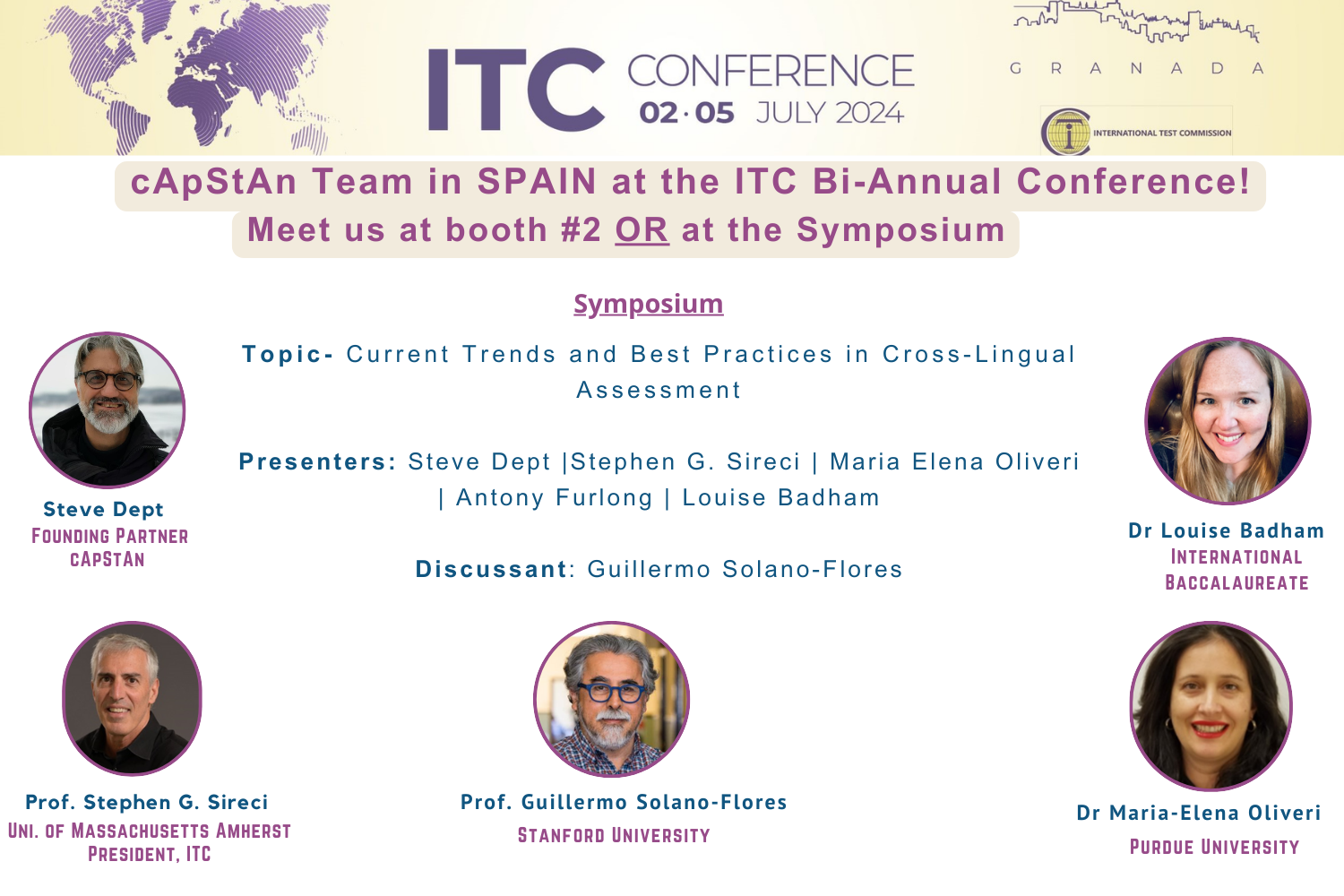
International Test Commission (ITC) Conference 2024, Granada, Spain, July 2-5, 2024 | Working together to improve cross-cultural assessment and research
The International Test Commission (ITC) contributes to promoting effective, valid and fair testing and assessment practices around the world. The imminent ITC conference in Granada (July 2-5) has a strong focus on equity and inclusion when making decisions or comparisons based on tests and questionnaires. The conference theme is “Working together to improve cross-cultural assessment”, which happens to be at the core of cApStAn’s activity. Talk to the cApStAn team at booth #2 at the conference venue.
The ITC Granada conference is the hub that helps you stay abreast of the latest research, and provides the ideal forum to network with colleagues. The ITC is where researchers and field practitioners connect, exchange notes, and embark on collaborative projects.
The conference will hold a symposium titled “Current Trends and Best Practices in Cross-Lingual Assessment” and structured in the form of four presentations, which discussant (Guillermo Solano-Flores) will comment on:
- A review of the literature on methods for developing and evaluating cross-lingual assessments
- A discussion of the process of adapting source language versions of tests into other languages
- A description of the approach of developing different language versions of an exam in parallel fashion
- An overview of the adaptation, quality assurance and quality control procedures involved in international large-scale assessments.
Ample time will be provided for discussion with the audience.
Paper 1: Developing, Facilitating, and Evaluating Validity and Comparability in Multi-Language Assessment Programs: A Review of the Literature (Presenter: Stephen G. Sireci, Maria Elena Oliveri, and Louise Badham)
Developing multiple language versions of an assessment often requires several layers of qualitative and quantitative processes. What does the literature say about translating (adapting) assessment materials and about statistical adjustments of scores from their different language versions to promote comparable score interpretations.
Paper 2: Developing and Evaluating Exams for Use Across Multiple Languages: The Successive (Adaptation) Model (Presenter: Maria Elena Oliveri, Stephen G. Sireci, & Louise Badham)
A description of the process of translating and adapting International Baccalaureate (IB) exams, focusing on the application of the successive adaptation model, which involves the development of exams in a source language, typically English, followed by the translation (or adaptation) of these exams into other languages.
Paper 3: Maintaining Rigor and Comparability Across Different Language Versions of Language and Literature Assessments (Presenter: Louise Badham, Antony Furlong, Stephen G. Sireci & Maria Elena Oliveri)
Developing fair, valid and comparable assessments for linguistically and culturally diverse populations of test-takers is a complex and challenging endeavour. How does IB ensure equivalent levels of demand across different language versions of their language and literature assessments.
Paper 4: Best Practices in Adapting Test Across Languages: Lessons from cApStAn’s Twenty-Five Years of Trial and Error (Presenter: Steve Dept)
In the late 1970s and early 1980s, comparative researchers established that variability in translation quality could compromise cross-country equivalence in multilingual data collection. Merely comparing back translations of the translated items to the initial version fails to detect sources of construct-irrelevant variance. More importantly, it does not consider that intentional deviations from the master version may be necessary to maintain equivalence. Steve supervised linguistic quality assurance of ILSAs for the past 25 years and shares empirical observations on the relevance and limitations of the criteria and metrics used to assess linguistic equivalence.
Watch out for the symposium. See you all in Granada from 2nd to 5th of July, 2024!